We are developing the social individualist meta-context for the future. From the very serious to the extremely frivolous... lets see what is on the mind of the Samizdata people.
Samizdata, derived from Samizdat /n. - a system of clandestine publication of banned literature in the USSR [Russ.,= self-publishing house]
|
This argument is illogical and does not hold water. There are many acts which the government can carry out on the international plane under the European treaties which have the effect of altering UK domestic law, and in doing so either confer rights on people or deprive them of rights. Whenever the UK representative on the Council of Ministers joins in passing into law a directly applicable EU Regulation then the Crown in using the prerogative power to alter internal UK law without that alteration of the law going through Parliament. This is simply a consequence of the direct effect machinery of the 1972 Act.
So why should it be OK to have “more Europe” through exercise of the prerogative power, but wrong to have “less Europe” as a result of Article 50 being invoked and the direct effect parts of EU law ceasing to apply within the UK? Nothing in the wording of the 1972 Act supports such a distinction.
– Martin Howe QC, Thomas Sharpe QC, Clive Thorne, Francis Hoar from Lawyers for Britain
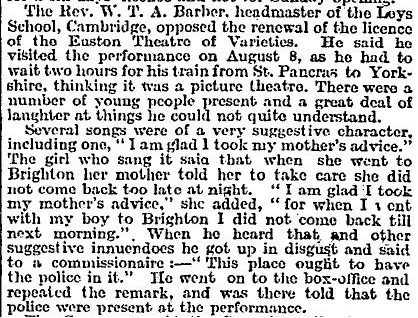 The Times 3 November 1916 p6
I believe in making a bit of a fuss about visiting pro-free-market luminaries. Our movement needs celebs, and one good way to get celebs is to make our own people into celebs. One more photo of whoever it is, on a blog, won’t turn him into a celeb on its own, but every little helps. So, below is a photo I took last week, of Robert Lawson, during the Q&A after a talk that he gave at the Adam Smith Institute office in Great Smith Street, on the subject of the Economic Freedom of the World, and more to the point, on the measuring of it:
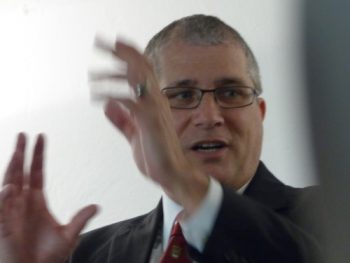
He looks like he’s conducting an orchestra, doesn’t he? Actually, he was drawing graphs in the air in front of him. The lighting in the ASI’s upstairs premises where this talk took place prefers to light the walls rather than the speaker, so that was one of the very few semi-adequate photos of Lawson that I managed.
This other photo, on the other hand, which showed the final graphic that Lawson gave us on one of those big telly screens that used to cost a fortune but which are now ubiquitous (thank you: economic freedom), came out much better, because the screen supplied its own light:
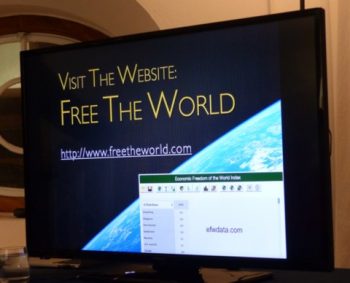
Free The World indeed.
This work by Robert Lawson, putting numbers to which countries are doing what in the realm of economic freedom, should not be confused with that being done by a rival enterprise, the Heritage Foundation.
It’s good that there is competition in this important intellectual arena, but to me it is very confusing, and I don’t think I am the only one thus confused. The ASI email about the event included the words “Economic Freedom of the World Index”. But googling for that before the event took me to this Heritage site. On the subject of this rivalry, Lawson was very polite, and I think we all sensed some behind-the-scenes animosity there. He described the Heritage Freedom Index as somewhat more speculative and opinion-based and less based on actual data sets, supplied by others, than his own efforts. “Black box” was the phrase he used, by which he meant that it is harder to scrutinise how the decisions were arrived at in the Heritage process than it is to scrutinise the Fraser Institute process. In contrast, all the data that Lawson referred to in his talk, with his other graphic offerings on the screen above, is publicly available.
Here is a .pdf of the Economic Freedom of the World 2016 Annual Report, which tells the story as of 2014, which I believe is the latest date that Lawson has done the sums for. Scroll down to page 8 and you get the big national league table. The positions I notice are: Hong Kong in the lead, the UK at number 11, USA at 16. Hong Kong is top every time. The UK is holding about steady. The USA has been falling steadily during the last couple of decades or so.
Lawson also drew our particular attention to that remarkable ex-USSR-possession, Georgia, which is trying to do a Leicester City and is currently at 6. (Heritage doesn’t include Georgia in its top 10.)
And so on. Hours of fun to be had. The more serious point is that economic freedom the world over had been rising healthily until about 2010, but is now flatlining.
True Believer Austrianists might have winced a little at Lawson’s determination to be empirical, to gather evidence, to test theory against fact. He was quite explicit that social science, broadly defined (in the German manner) to mean systematically gathered and systematically tested knowledge about how the world works, is something that is entirely possible. He pointed out that economics is not the only science that is unable to conduct all the experiments it might like to, but instead must mostly depend on theories, and on observations to test those theories. When was the last time you saw an astronomer conducting an experiment with some planets or stars?
But, please don’t take my word for any of this. Thank goodness for those websites, because if you really want to get to grips with all this stuff, you need not depend on me to tell you about it. All I really want to say here is: interesting man, interesting talk, and well done the ASI for hosting it. Apparently Lawson was only here because he wanted to be at this sporting event, last Sunday. If so, then thank you: sport.
Second, anyone who thinks MPs will reject Article 50 in such a vote is deluding themselves. The overwhelming majority of the Parliamentary Conservative Party now wants to get on with implementing the outcome of the referendum, regardless of which side they were on in the campaign. A pleasantly surprising number of Labour MPs have also taken on board the message from their Leave-voting constituencies. Having gone through the unpleasant experience of being at loggerheads with their voters on the doorstep, they rightly don’t want to defy them now they have spoken. The referendum may have been advisory, but its advice was clear – and when seen in pseudo-First Past The Post terms, ie in terms of MPs’ constituencies, Leave won a two thirds majority. Ultimately, de facto sovereignty lies with the electorate, and politicians value their seats.
– Mark Wallace
The High Court has ruled that the government must get Parliamentary approval before it triggers Article 50. So we are a three-line-whip away from triggering Article 50. Big deal.
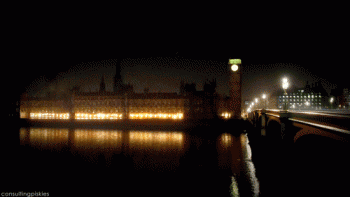
… then it would be well into the rebellious years of smoking behind bike sheds and dealing with raging hormones, because today Sami turns fifteen, which means it can legally do the wild thing in France as of this moment. What could possibly go wrong? 😛
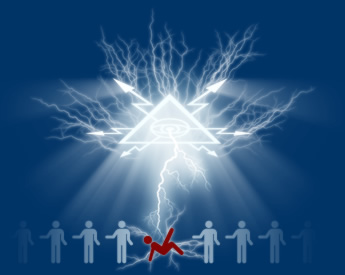


…it is a symbol that the bearer has made a donation to the Royal British Legion’s Haig Fund.
I thought it might be worth pointing that out bearing in mind recent kerfuffles.
I was searching for God and found Cthulhu. So I asked why he wasn’t running for President of the United States this year. He replied the market for Greater Evils was saturated.
A while ago a Russian friend of mine in Sakhalin asked what people in the West were saying about Russia. I told him that most people really couldn’t care less about Russia or what it is doing. The average Brit or American cares as much about Russia as they do the sale that’s on at the bread-counter of their local supermarket. The Cold War ended some time ago and the widespread interest in Russia disappeared. It is only those who follow geopolitics that care a jot about what Russia is doing and why, nobody else cares. This is probably something that drives Putin nuts.
– Tim Newman
The following article over at the CapX site explains why the UK should go for unilateral free trade immediately, and summons up arguments deployed a century and a half ago by the likes of Richard Cobden, and Sir Robert Peel, the Conservative prime minister of the time (who had a rather stronger grasp of political economy than, I suspect, any member of the present government):
I trust the government … will not resume the policy which they and we have found most inconvenient, namely the haggling with foreign countries about reciprocal concessions, instead of taking that independent course which we believe to be conducive to our own interests…[L]et us trust that our example, with the proof of practical benefits we derive from it, will at no remote period insure the adoption of the principles on which we have acted… Let, therefore, our commerce be as free as our institutions. Let us proclaim commerce free, and nation after nation will follow our example.
And these comments from the author of the CapX article, Louis Rouanet, who is a student in Paris, strike me as crucial:
A unilateral free trade program is very simple: the British Parliament declares the abolition of all tariffs. To avoid a race in non-tariff barriers, the Parliament can pass a law declaring that every product which conforms to the EU norms and regulations can be sold freely in the UK. This should not be a problem since the UK still is a member of the EU.
By Parliament’s act, most of the “non-tariff barrier” problem withers away without any need for regulatory harmonisation. If the EU legislator considers it necessary to regulate the curvature of vegetables, so be it! But, although EU producers will be free to sell their product in the UK, the British legislature may deem it unnecessary to regulate its producers in the same absurd way.
The advantages of this approach are many. First, the UK can have free trade now instead of waiting through years of negotiations. No need to wait for bureaucrats to agree on which laws we burden consumers and producers with.
Read the whole thing, as they say.
I thought I would try to do the National Novel Writing Month thing. It is probably a terrible idea. Announcing it here is probably an even worse idea. I have half a dozen novel ideas I will probably be mashing up together. There will be aliens, strange people who invite strangers into their flats to give and listen to talks, and a not-too-in-your-face libertarian message. Or I might give up half-way through after realising that there is no value in the sleep-deprived ramblings of a man struggling to make an arbitrary word count by an arbitrary deadline.
Use the comments thread for encouragement, to tell me I’m an idiot, give me ideas for scenes (I have some crazy alien technology that means I can do almost anything), announce your own similar efforts, or talk about what a libertarian novel might look like.
In her 1993 paper “Causality Then and Now: Al Ghazali and Quantum Theory” Karen Harding makes the point that what is now called the “Occasionalism” of the 11th century Islamic thinker Al Ghazali is similar to the 20th century “Copenhagen Interpretation” of Quantum Theory. Al Ghazail’s position being to deny cause and effect, to claim that things just happen because God (in the Copenhagen Interpretation “the observer”) make them happen. For example that dropping a pot on a stone floor does not make the pot smash – that God first makes the pot drop (no law of gravity as such) and then makes the pot smash, with no necessary connection to the dropping of the pot. In the “Copenhagen Interpretation”, in Schrodinger’s famous attack upon the theory, a cat in a box is neither alive or dead till we open the box and “observe” the cat.
David Hume, back in the 18th century took God out of this form of thinking and just made it “ideas” associating in “the mind” – although Mr Hume also denied the existence of the mind, the “I”, at least in the ordinary common sense meaning of the term.
Karen Harding was not led by all the above to doubt the “Copenhagen Interpretation”, on the contrary she wrote to praise Al Ghazali (and thinkers like him) in spite of the effect of such thinking in closing the Islamic mind to science, to objective reality, and thus ending the “Golden Age”.
And Douglas Haig? As a Calvinist General Haig, like Al Ghazali (and other mainstream thinkers of Sunni Islam) was a Predestinationist – whatever happened was the will of God. If 20 thousand British soldiers were killed and 30 thousand wounded on one day (July 1st 1916) this is clearly what God wanted to happen and was, therefore, not the fault of Douglas Haig. And as General Haig was part of the “Elect” (Predestined for Salvation) he was, by definition, a good man. Therefore he, Haig, showed no shame over his conduct – as his conduct was, by definition, good (as he was part of God’s Elect), whatever he did. Backstabbing his commanding officer to get his job? Getting hundreds of thousand of British soldiers killed in offensives such as the Somme and Passchendaele? Picking incompetents such as Gough to conduct parts of the Passchendaele offensive in 1917 and the defence of the Western Front in 1918? Supporting calling off the war in 1918 just as the Allies were stating to win? Sending ten thousand men on a suicide attack on the second day of the Battle of Loos (eight thousand British soldiers either killed or wounded – German dead? what German dead?) in 1915? None of this was anything to be ashamed of, as it was all part of the Divine Plan – Divine Providence, the Will of God.
The only commanders to be punished were those commanders who resisted Divine Providence – by, for example, not sending their men into suicide attacks on July 1st 1916 – such men were sent home in disgrace for not showing sufficient “fighting spirit”. The tactics were wrong? The plan could not work? That form of thinking assumes objective reality and cause and effect – for example a connection between the orders of Douglas Haig and 20 thousand British soldiers being killed and 30 thousand being wounded on one day (July 1st 1916). But if objective realty does not exist, and there is no law of cause and effect – then reality is just what God (or “the observer” – in this case Douglas Haig) want it to be.
So people such as Paul Marks – who “combine the obsessive intellectualism of a Jew, with the wild temper of a Irishman” are just silly to get upset about it.
|
Who Are We? The Samizdata people are a bunch of sinister and heavily armed globalist illuminati who seek to infect the entire world with the values of personal liberty and several property. Amongst our many crimes is a sense of humour and the intermittent use of British spelling.
We are also a varied group made up of social individualists, classical liberals, whigs, libertarians, extropians, futurists, ‘Porcupines’, Karl Popper fetishists, recovering neo-conservatives, crazed Ayn Rand worshipers, over-caffeinated Virginia Postrel devotees, witty Frédéric Bastiat wannabes, cypherpunks, minarchists, kritarchists and wild-eyed anarcho-capitalists from Britain, North America, Australia and Europe.
|










